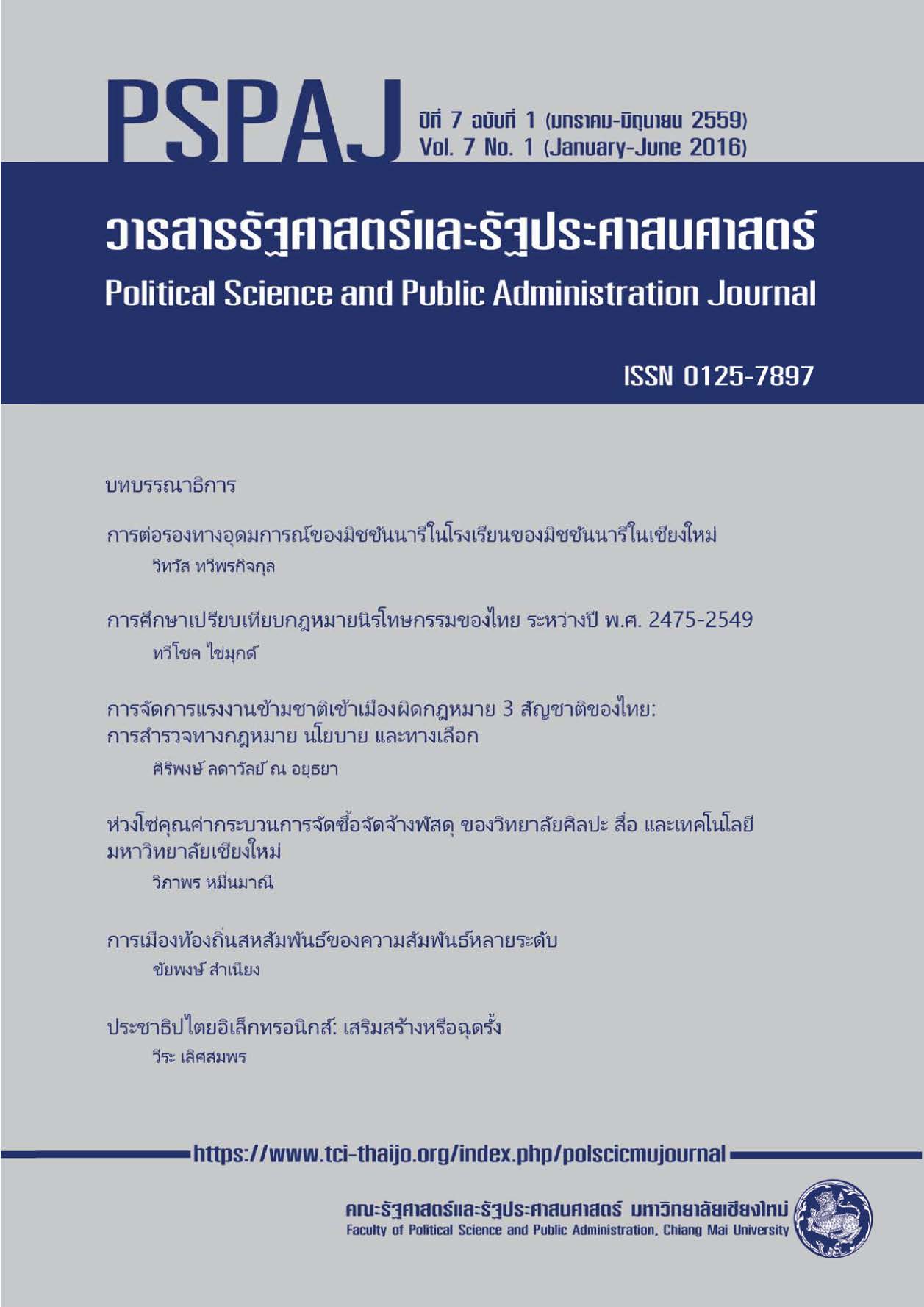ห่วงโซ่คุณค่ากระบวนการจัดซื้อจัดจ้างพัสดุ ของวิทยาลัยศิลปะ สื่อ และเทคโนโลยี มหาวิทยาลัยเชียงใหม่
Main Article Content
บทคัดย่อ
การศึกษาเรื่องห่วงโซ่คุณค่ากระบวนการจัดซื้อจัดจ้างพัสดุของวิทยาลัยศิลปะ สื่อ และเทคโนโลยี มหาวิทยาลัยเชียงใหม่โดยนำห่วงโซ่คุณค่ามาเชื่อมโยงกิจกรรมต่างๆ เพื่อสร้างคุณค่าให้กับกระบวนการจัดซื้อจัดจ้างพัสดุให้ตอบสนองต่อความต้องการของผู้มีส่วนได้ส่วนเสียและผู้ใช้บริการให้เกิดความพึงพอใจ เป็นไปอย่างมีประสิทธิภาพ โดยมีวัตถุประสงค์ในการศึกษา คือ 1) เพื่อศึกษากระบวนการห่วงโซ่คุณค่าของกระบวนการจัดซื้อจัดจ้างพัสดุของวิทยาลัยศิลปะ สื่อ และเทคโนโลยี มหาวิทยาลัยเชียงใหม่ และ 2) เพื่อศึกษาปัจจัยที่ส่งผลกระทบต่อกระบวนการจัดซื้อจัดจ้างพัสดุ ของวิทยาลัยศิลปะ สื่อ และเทคโนโลยี มหาวิทยาลัยเชียงใหม่ โดยเป็นการศึกษาวิจัยเชิงคุณภาพ จากการวิเคราะห์เนื้อหาวิเคราะห์กระบวนการแล้วนำมาจัดทำ SIPOC Model และห่วงโซ่คุณค่า (Value Chain) ซึ่งเป็นการวิเคราะห์เชิงพรรณนา ข้อมูลหลักมาจากการสัมภาษณ์และสังเกตการณ์แบบมีส่วนร่วมกับผู้ให้ข้อมูล 3 กลุ่ม แบ่งออกเป็น กลุ่มที่ 1 ผู้บริหารวิทยาลัยศิลปะ สื่อ และเทคโนโลยี มหาวิทยาลัย เชียงใหม่ กลุ่มที่ 2 ผู้ปฏิบัติงานที่เกี่ยวข้องกับการจัดซื้อจัดจ้างพัสดุ และกลุ่มที่ 3 ผู้รับบริการ จำนวนทั้งหมด 37 คน
ผลการศึกษาพบว่า กระบวนงานการกำหนดความต้องการใช้พัสดุ เป็นกระบวนงานที่ก่อให้เกิดคุณค่าของวิทยาลัยศิลปะ สื่อ และเทคโนโลยี มหาวิทยาลัยเชียงใหม่ โดยในกระบวนงานนี้มีการดำเนินกิจกรรมที่ก่อให้เกิดคุณค่า คือ 1) ลดความซ้ำซ้อนของรายการพัสดุที่จะจัดซื้อจัดจ้าง 2) ลดกระบวนการขั้นตอนการทำงาน ลดต้นทุน และลดระยะเวลาในการจัดซื้อจัดจ้างพัสดุ 3) ลดความผิดพลาดในการจัดซื้อจัดจ้างพัสดุที่ไม่ถูกต้องตามคุณลักษณะเฉพาะของพัสดุ (SPEC) และ 4) ช่วยในการตัดสินใจของผู้บริหาร ด้านการบริหารจัดการพัสดุ และการบริหารงบประมาณ จากการวิเคราะห์กระบวนงานดังกล่าวพบว่าประกอบด้วยกิจกรรมหลัก (Primary Activities) 5 กิจกรรม ซึ่งเป็นกระบวนการปฏิบัติงานที่เกิดขึ้นเพื่อให้กิจกรรมขององค์การบรรลุวัตถุประสงค์ได้ ได้แก่ 1) การกำหนดความต้องการใช้พัสดุ 2) การตรวจสอบงบประมาณ 3)การจัดซื้อจัดจ้างพัสดุ 4) การส่งมอบพัสดุ 5) การตรวจรับพัสดุ และกิจกรรมสนับสนุน (Support Activities) 4 กิจกรรม ซึ่งเป็นกิจกรรมที่ช่วยส่งเสริมและสนับสนุนให้กิจกรรมหลักสามารถดำเนินไปได้และช่วยเพิ่มคุณค่าให้กระบวนการจัดซื้อจัดจ้างพัสดุ ได้แก่ 1) โครงสร้างพื้นฐานขององค์กร 2) การบริหารทรัพยากรมนุษย์ 3) การพัฒนาเทคโนโลยี 4) การจัดหาทรัพยากร นอกจากนั้น ปัจจัยที่ส่งผลกระทบต่อกระบวนการจัดซื้อจัดจ้างพัสดุให้มีประสิทธิภาพและประสิทธิผลสูงสุดนั้นเกิดจากองค์ประกอบสำคัญ 2 ส่วน ได้แก่ 1) นโยบายขององค์กร (ระบบงาน) 2) บุคลากร
Downloads
Article Details
- เนื้อหาและข้อมูลที่ลงตีพิมพ์ในวารสารรัฐศาสตร์และรัฐประศาสนศาสตร์ถือเป็นข้อคิดเห็นและความรับผิดชอบของผู้เขียนบทความโดยตรง ซึ่งกองบรรณาธิการวารสารรัฐศาสตร์และรัฐประศาสนศาสตร์ ไม่จำเป็นต้องเห็นด้วย หรือร่วมรับผิดชอบใดๆ
- บทความและข้อมูล ที่ได้รับการตีพิมพ์ในวารสารรัฐศาสตร์และรัฐประศาสนศาสตร์ ถือเป็นลิขสิทธิ์ของวารสาร หากบุคคลหรือหน่วยงานใดต้องการนำข้อมูลไปใช้ประโยชน์ในทางวิชาการ ขอให้อ้างอิงแหล่งที่มาด้วย
เอกสารอ้างอิง
กรมบัญชีกลาง สำนักมาตรฐานระบบพัสดุภาครัฐ. (2549). แนวทางการปฏิบัติตามระเบียบสำนักนายกรัฐมนตรีว่าด้วยการพัสดุด้วยวิธีการทางอิเล็กทรอนิกส์ พ.ศ. 2549. กรุงเทพฯ:กรมบัญชีกลาง.
จรูญโรจน์ สุทธะนะ.(2552). ห่วงโซ่คุณค่าด้านการบริการสาธารณสุขของเทศบาลตำบลสันทรายหลวง อำเภอสันทราย จังหวัดเชียงใหม่. การค้นคว้าแบบอิสระ สาขาวิชารัฐประศาสนศาสตรมหาบัณฑิต. บัณฑิตวิทยาลัย มหาวิทยาลัยเชียงใหม่, เชียงใหม่.
ณิศ์ภาพรรณ คูวิเศษแสง. (2552). จริยธรรมในการบริหารงานพัสดุ (Procurement ethics). กรุงเทพมหานคร:โรงพิมพ์อักษรไทย (นสพ. ฟ้าเมืองไทย).
ติน ปรัชญาพฤทธิ์. (2553).ทฤษฎีองค์การ (Organization Theory). (พิมพ์ครั้งที่5).กรุงเทพฯ: อินทภาษ.
ผลิน ภู่จรูญ. (2548). การจัดการธุรกิจร่วมสมัย. (พิมพ์ครั้งที่ 4). กรุงเทพมหานคร: เอกพิมพ์ไท.
พนาไพร คุ้มสดวก. (2554). ห่วงโซ่คุณค่ากระบวนงานผู้สูงอายุ เทศบาลตำบลสุเทพ อำเภอเมืองเชียงใหม่. การค้นคว้าแบบอิสระ สาขาวิชารัฐประศาสนศาสตรมหาบัณฑิต. บัณฑิตวิทยาลัย มหาวิทยาลัยเชียงใหม่, เชียงใหม่.
มหาวิทยาลัยเชียงใหม่. (2551). ข้อบังคับมหาวิทยาลัยเชียงใหม่ว่าด้วยการพัสดุ พ.ศ. 2551. เชียงใหม่:มหาวิทยาลัยเชียงใหม่.
ยรรยง ศรีสม.(2553). ห่วงโซ่คุณค่า Value chain ในงานโลจิสติกส์. ค้นเมื่อ 23 มีนาคม 2558, จาก https://www.tpa.or.th/publisher/pdfFileDownloadS/TN211A_p039-44.pdf
วิทยาลัยศิลปะ สื่อ และเทคโนโลยี มหาวิทยาลัยเชียงใหม่. (2558). รายงานการประชุมโครงการแลกเปลี่ยนเรียนรู้ด้านกระบวนการจัดซื้อจัดจ้างพัสดุ. เชียงใหม่: มหาวิทยาลัยเชียงใหม่.
ศุภชัย เมืองรักษ์. มปป. การคิดเชิงระบบในการบริหาร .ค้นเมื่อ 30 มิถุนายน 2558 , จาก
https://202.183.190.2/FTPiWebAdmin/knw_pworld/image_content/62/BusinessResult62.pdf
สำนักงานคณะกรรมการพัฒนาระบบราชการ. (2557). เกณฑ์คุณภาพการบริหารจัดการภาครัฐ พ.ศ.2558. กรุงเทพฯ: วิชั่น พริ้นท์ แอนด์ มีเดีย.


